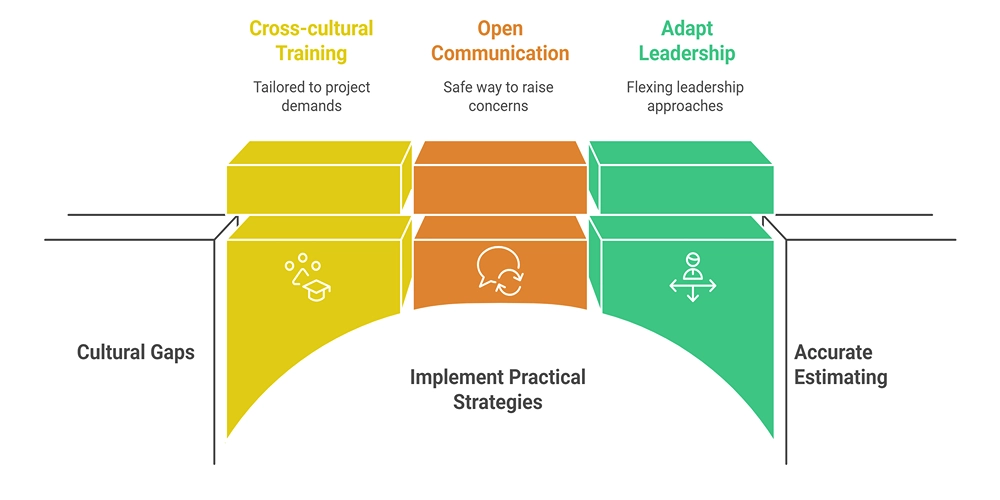Building trust across global project teams starts with understanding diverse work values and communication styles. Nurturing Cultural Sensitivity in Offshoring enables construction companies to enhance collaboration, reduce conflicts, and improve productivity. Studies show culturally aware teams deliver 30% faster project outcomes while maintaining higher safety and compliance standards.
Why Cultural Sensitivity Matters in Offshoring
Cultural sensitivity in offshoring is more than courtesy; it creates an environment where diverse perspectives drive innovation and efficiency. In construction projects, where accurate estimating and coordination are vital, cultural misunderstandings can cause costly delays. Even something as simple as interpreting deadlines differently across cultures can disrupt procurement, safety, and scheduling.
The financial impact is significant, with studies showing that poor communication often linked to cultural gaps contributes to more than half of global project failures. By nurturing sensitivity, teams minimise errors in offshore estimating, improve collaboration, and build trust with stakeholders. This cultural awareness not only prevents setbacks but also strengthens resilience and ensures projects stay within scope.
Common Cultural Challenges in Offshore Projects
Offshore construction projects often face cultural hurdles that can weaken team morale and increase costs. A common issue is hierarchy, where questioning authority is discouraged, leading to unreported problems during estimating. In some cases, estimators hesitate to raise pricing discrepancies, assuming their concerns will be understood.
Time management also creates friction, with some teams treating schedules as strict while others view them as flexible. These differences disrupt coordination and supply chains, particularly when markets are influenced by local customs or holidays. Communication gaps add further strain, yet addressing them early helps offshore projects stay on track.Offshoring Definition, Benefits & Challenges [2025]
Building Awareness: Understanding Global Work Practices
To nurture cultural sensitivity, start by building a solid foundation of awareness about global work practices. This means delving into how different regions approach construction norms, from work ethics to decision-making processes. In offshore settings, understanding these can transform potential conflicts into opportunities for synergy.
For instance, in Asian markets, relationship-building often precedes business dealings, which influences how estimating teams negotiate with suppliers. Rushing this could lead to suboptimal deals or overlooked risks. Conversely, in European contexts, emphasis on work-life balance might affect after-hours availability, requiring adjustments in project timelines.
Practical Strategies for Enhancing Cultural Sensitivity

Building cultural sensitivity in offshore construction depends on applying strategies that turn awareness into action. Cross-cultural training, adaptive leadership, feedback channels, and integrating safety practices all help reduce misunderstandings, strengthen trust, and create smoother collaboration among diverse international teams.Construction Safety Culture: Creating a Safe Workplace
Cross-cultural training and workshops
Cross-cultural training isn’t a one-off event; it’s an ongoing process tailored to your team’s needs. Workshops that simulate real scenarios, like negotiating estimates across cultures, help participants grasp subtle cues. For example, role-playing a bid discussion with Middle Eastern partners can highlight the importance of indirect language, reducing miscommunications that affect cost projections.
Encouraging open communication and feedback
Fostering open channels where feedback flows freely builds trust. Regular check-ins, using tools like anonymous surveys, allow team members to voice cultural concerns without fear. In one project I managed, this revealed how email tones were misinterpreted, leading to refined guidelines that smoothed estimating collaborations.
Adapting leadership styles to diverse teams
Leaders must flex their styles to suit the team. In hierarchical cultures, a more directive approach works, while egalitarian ones thrive on inclusivity. Adapting ensures everyone contributes to accurate offshore construction estimating, where diverse insights catch blind spots.
Role of Cultural Sensitivity in Strong Client–Contractor Relationships
Cultural sensitivity is pivotal in strengthening client–contractor relationships in offshore construction. It ensures respectful interactions, reduces friction from mismatched expectations, and builds trust. Simple gestures, such as acknowledging cultural holidays in project schedules, create goodwill and encourage repeat business.
This awareness also improves estimating, where transparent discussions on cultural cost factors enhance credibility and trust. Linking efforts to offshore regulatory compliance shows professionalism and confidence in managing global standards. Empathy in adapting to local customs during site management ensures smoother handovers and fosters positive referrals.
Case Studies: Lessons from Offshore Construction and Estimating Projects
Real-world examples show how cultural sensitivity drives offshore project success. In one Australian-led project in Southeast Asia, early estimating ignored local negotiation customs, causing a 15% budget overrun. After cultural briefings, the team adjusted their approach, recovered costs through supplier deals, and improved collaboration.
A European contractor in the Middle East faced project approval delays due to feedback gaps, but targeted workshops resolved the issues and improved cost forecasting. In a similar way, a U.S. firm operating in India embedded cultural respect into daily routines, creating smoother collaboration. This approach reflected offshore construction estimating best practices, enabling on-time project delivery and increasing team retention by 20%.
Long-term Benefits of Cultural Sensitivity in Offshoring
- Stronger reputation for reliability in the global construction sector, attracting premium clients and top talent.
- Reduced risks in estimating by spotting cultural market shifts early and optimising budgets.
- Higher employee engagement and lower turnover, as shown in Deloitte’s 30% improvement for culturally agile firms.
- Greater innovation, with diverse viewpoints driving creative solutions in estimating and project execution.
Best Practices for Embedding Cultural Respect in Daily Operations
To make cultural respect a staple in daily operations, integrate it seamlessly into routines. Start with inclusive policies, like flexible meeting times that account for time zones and cultural observances, ensuring everyone participates fully in estimating discussions.
Regular audits of processes can help; review how cultural factors influence workflows and adjust accordingly. For example, incorporating diverse holidays into project calendars prevents scheduling snafus. The table below outlines core best practices and their impacts:
| Best Practice | Key Impact on Offshore Operations |
| Inclusive policy development | Boosts morale and reduces absenteeism |
| Ongoing cultural audits | Identifies gaps early, preventing costly errors |
| Diverse team mentorship | Builds skills transfer, enhancing estimating accuracy |
Making Cultural Sensitivity a Core Business Value
In wrapping up, nurturing cultural sensitivity in offshoring isn’t just an add-on; it’s a fundamental value that drives excellence in construction. By prioritising it, firms not only navigate challenges but thrive in a connected world, delivering projects that stand the test of time. Commit to this, and watch your offshore ventures flourish with mutual respect at their core.


